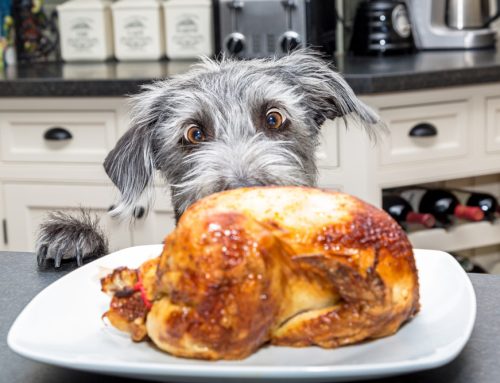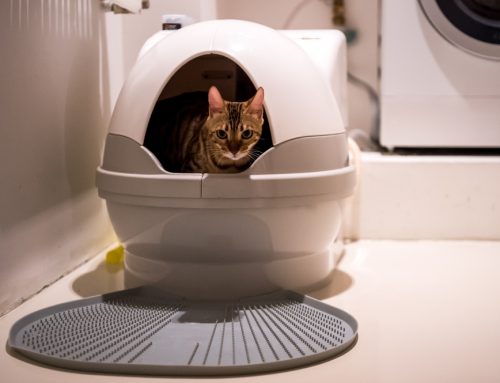Pets are curious, and their interest can lead to a toxin encounter and potentially become a veterinary emergency. Our West Vets ER team doesn’t want your pet to experience toxin exposure, so we are providing information about pet toxins found in and around many homes, and tips to help protect your four-legged family member.
Common pet toxins found in your kitchen
Most pets are extremely food-driven, and routinely beg for food or scavenge from the garbage. However, because not all human food is safe for pets, this behavior can end in an emergency veterinary visit if they eat a toxic ingredient. Common pet toxins found in the kitchen include:
- Chocolate — Do you keep a chocolate stash to appease your sweet tooth when a craving strikes? If so, ensure your pet can’t access the sweet stuff. Chocolate contains caffeine and theobromine, which cause signs that include vomiting, diarrhea, restlessness, muscle tremors, and seizures. The darker the chocolate, the more severe the reaction.
- Grapes — Grapes and raisins are healthy snacks for people, but they aren’t good for pets, because they can cause acute kidney damage. Signs include vomiting, diarrhea, excessive thirst and urination, and abdominal pain.
- Onions — All Allium family vegetables, such as onions, garlic, shallots, leeks, and chives, contain N-propyl disulfide, which causes oxidative damage to a pet’s red blood cells, leading to anemia. Initial signs include lethargy and vomiting, and then weakness, pale mucous membranes, reddish urine, and collapse as the condition progresses.
- Xylitol — Xylitol is a commonly used artificial sweetener found in sugar-free or low-sugar foods and candies. While beneficial to humans, the ingredient causes a dose-dependent insulin release in pets, resulting in severe hypoglycemia, with signs that include vomiting, weakness, tremors, and seizures.
Common pet toxins found in your medicine cabinet
Many human prescription and over-the-counter (OTC) medications are used in veterinary medicine, but they can also lead to pet toxicity. Common culprits include:
- Ibuprofen — Ibuprofen is a non-steroidal anti-inflammatory (NSAID) medication that is used to manage pain, fever, and inflammation. Pets are extremely sensitive to the drug’s toxic effects, which can cause gastrointestinal, kidney, and central nervous system damage. Signs include vomiting, diarrhea, excessive thirst and urination, seizures, and coma.
- Acetaminophen — Acetaminophen is a popular OTC medication that is also available in prescription strength. Pets metabolize the drug differently than humans, and cats are especially sensitive. Acetaminophen can cause liver damage or inhibit the red blood cells’ ability to carry oxygen. Signs include panting, elevated heart rate, vomiting, drooling, and jaundice.
- Antidepressants — Medications such as selective serotonin reuptake inhibitors, serotonin and norepinephrine reuptake inhibitors, tricyclic antidepressants, and monoamine oxidase inhibitors, which humans use to balance their mood, can be toxic to pets. Overdoses can lead to neurologic problems, such as extreme sedation, incoordination, tremors, and seizures. Some also have stimulant effects that cause a dangerously elevated heart rate, blood pressure, and body temperature.
- Attention deficit and hyperactivity disorder (ADHD) medications — These medications contain potent stimulants that can cause heart problems, elevated body temperatures, tremors, and seizures in pets.
Common pet toxins found in your yard
Numerous plants that you use to decorate your home and yard are toxic to pets. These include:
- Lilies — Every part of the lily is toxic to pets, including the vase water. Cats are especially susceptible to lily toxicity, and ingesting only a small amount can lead to severe kidney damage.
- Rhododendrons — Rhododendrons and azaleas contain a neurotoxin called grayanotoxin that is highly toxic to pets. Signs include vomiting, diarrhea, weakness, incoordination, tremors, blindness, seizures, and coma.
- Yew — Yew trees, which are among the most toxic North American plants, contain cardiotoxic taxine alkaloids that cause signs including vomiting, diarrhea, trembling, difficulty breathing, and sudden death.
- Tulips — Tulip bulbs contain allergenic lactones, which are toxic to pets. Signs include vomiting, diarrhea, increased heart and respiratory rate, and difficulty breathing.
Common pet toxins found in your garage
Your garage likely has many interesting smells that your pet wants to investigate, but their exploration can lead to toxin exposure. Common pet toxins found in your garage include:
- Ethylene glycol — Ethylene glycol, which is found in many anti-freeze products, tastes sweet to pets, but ingestion can severely damage kidneys.
- Rodenticides — Numerous products on the market that are used to combat rodents are poisonous to pets. Signs depend on the product ingested.
Tips to protect your pet from common toxins

Tips to reduce your pet’s risk for toxin exposure include:
- Keeping your garbage in sealed containers to prevent dumpster diving
- Keeping food behind secure doors or in sealed containers
- Reading the label before offering your pet a new food to ensure no toxic ingredients are included
- Not feeding your pet table scraps
- Never giving your pet medication without asking your veterinarian
- Securing your medications to ensure they are inaccessible to your pet
- Taking your medication alone in another room where your pet can’t grab a dropped pill
- Ensuring all plants you bring in your home or plant outside are safe for your pet
- Securing your guests’ purses and coats to ensure your pet can’t find toxic items in the pockets
- Not allowing your pet access to the area where you have used rodenticides
- Cleaning antifreeze spills as soon as possible
If your pet has a toxin exposure, every minute counts, and our West Vets ER team will drop everything to ensure they get the care they need. Contact us immediately if you know or suspect your pet has eaten an inappropriate food, so we can provide the fast, effective emergency care they need.







Leave A Comment